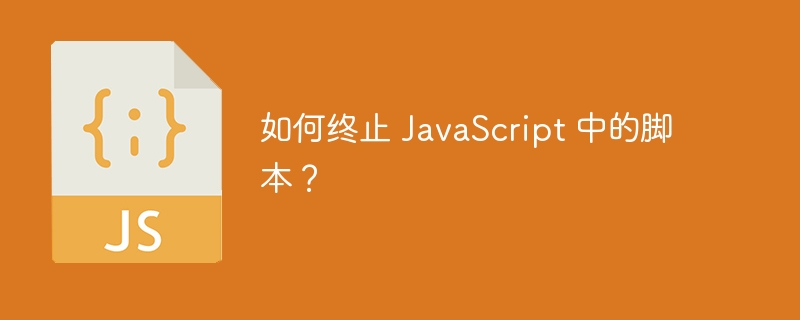如何终止 JavaScript 中的脚本?

脚本的终止意味着它停止执行 JavaScript 代码。在某些紧急情况下,开发人员需要在脚本执行过程中中止 JavaScript 代码的执行。
此外,我们还可以使用 if-else 语句来决定何时终止脚本执行以及何时继续。在这里,我们将学习中途终止脚本的不同方法。
使用退货声明
return 语句用于终止脚本内任何代码的执行。一旦我们在函数内部执行了return语句,return语句后面的代码就不会执行。但是,我们不需要使用 return 语句返回任何值,因为我们可以只使用 return 关键字。
语法
用户可以按照下面的语法使用 return 语句来终止 JavaScript 中脚本的执行。
function execute() {
// this code will be executed
return;
// this code will not be executed.
}
在上面的语法中,我们在函数中使用了 return 语句。
示例
在下面的示例中,每当文档加载到网页上时,我们都会调用execute() 函数。在execute()函数中,我们检查数组的第一个值是否存在并继续执行;否则,我们执行 return 语句来停止脚本的执行。
<html>
<body>
<h3>Using the <i> return statement </i> to terminate the script in JavaScript</h3>
<div id = "content"> </div>
<script>
let content = document.getElementById("content");
let array = [];
function execute() {
content.innerHTML = "This is a JavaScript code.";
if (!array[0]) {
return;
}
content.innerHTML = "This statment will not execute!";
}
execute();
</script>
</body>
</html>
在输出中,用户可以观察到函数的最后一条语句没有作为 if 语句评估 true 的条件执行,并且执行 return 语句。
抛出错误以终止脚本
我们可以使用 throw 关键字抛出自定义错误。我们可以使用 Error() 构造函数来创建一个新的错误。我们可以从脚本内的任何位置抛出错误来停止执行。当我们抛出错误时,它不会执行在 throw 语句之后编写的语句。
语法
用户可以按照下面的语法抛出错误来终止 JavaScript 中脚本的执行。
throw new Error("Error_Message");
在上述语法中,“Error_message”是向用户显示的错误消息。
示例
在下面的示例中,我们使用execute() 函数中的 throw 关键字抛出了错误。此外,我们还触发了 try-catch 块内的函数调用来处理错误。用户可以在输出中观察到,在我们抛出错误后,脚本将停止执行。
<html>
<body>
<h3>Throwing the <i> error </i> to terminate the script in JavaScript.</h3>
<div id = "content"> </div>
<script>
let content = document.getElementById("content");
let array = [];
function execute() {
throw new Error("This is an error to stop execution!");
content.innerHTML += "This statement will not execute!";
}
try {
execute();
}
catch (err) {
content.innerHTML += "Error: " + err.message;
}
</script>
</body>
</html>
使用clearInterval()方法
clearInterval()方法以定时器的id为参数来清除定时器。我们可以设置定时器来执行任何函数。例如,我们可以使用 setTimeOut() 方法在延迟一段时间后执行一些脚本。如果我们需要停止脚本的执行,我们可以在脚本执行之前使用clearInterval()方法清除超时。
语法
用户可以按照下面的语法使用clearInterval()方法来终止脚本的执行。
let timeVar = setTimeout(() => {
// stop execution of this script
},delay);
clearInterval(timeVar);
在上面的语法中,我们可以停止执行 setTimeOut() 方法的回调函数内编写的脚本。
示例
在下面的示例中,我们使用 setTimeOut() 方法在延迟 2000 毫秒后执行脚本。另外,我们将计时器的 id 存储在 timeVar 变量中。
我们在脚本执行之前使用clearInterval()方法清除计时器,这就是我们如何停止JavaScript中任何脚本的执行。
<html>
<body>
<h3>Using the <i> clearInterval() method </i> to terminate the script in JavaScript.</h3>
<div id = "content"> </div>
<script>
let content = document.getElementById("content");
let timeVar = setTimeout(() => {
content.innerHTML = "This is inside the setTimeOut() function!";
}, 2000);
content.innerHTML = "This is outside the setTimeOut() function!";
clearInterval(timeVar); // This will clear the setTimeOut() function.
</script>
</body>
</html>
使用 Node.js 中的 process.exit() 方法
process.exit() 不适用于普通 JavaScript,它仅适用于 Node.js,因为我们需要导入“process”模块。我们可以通过传递 0 作为参数来执行 process.exit() 方法来终止脚本。
语法
用户可以按照下面的语法使用process.exit()方法来终止脚本。
process.exit(0);
在上面的语法中,我们传递了 0 作为参数以用于终止目的。
示例
在下面的例子中,我们编写了JavaScript代码。我们在代码中导入了处理模块。我们已将 30 分配给“num”变量。 if 语句条件始终评估为 true,因此它将停止代码的执行,我们可以在输出中观察到这一点。
// Importing process module
var process = require('process');
let num = 30;
console.log("The value of number is " + num);
if(num > 20) {
process.exit(0);
}
console.log("This line will not be printed as process.exit() is called");
我们学习了在 JavaScript 中终止脚本的各种方法。第一种方法是使用return语句,第二种方法是抛出错误,第三种方法是使用clearInterval()方法,最后一种方法是使用process.exit()方法。
使用 return 语句终止脚本是最好的,但它只能在函数内部起作用。 clearInterval() 方法仅在 setTImeOut() 方法执行脚本之前立即终止脚本。 process.exit() 仅对 NodeJS 有帮助。
以上是如何终止 JavaScript 中的脚本?的详细内容。更多信息请关注PHP中文网其他相关文章!

热AI工具

Undresser.AI Undress
人工智能驱动的应用程序,用于创建逼真的裸体照片

AI Clothes Remover
用于从照片中去除衣服的在线人工智能工具。

Undress AI Tool
免费脱衣服图片

Clothoff.io
AI脱衣机

AI Hentai Generator
免费生成ai无尽的。

热门文章

热工具

记事本++7.3.1
好用且免费的代码编辑器

SublimeText3汉化版
中文版,非常好用

禅工作室 13.0.1
功能强大的PHP集成开发环境

Dreamweaver CS6
视觉化网页开发工具

SublimeText3 Mac版
神级代码编辑软件(SublimeText3)
 在JavaScript中替换字符串字符
Mar 11, 2025 am 12:07 AM
在JavaScript中替换字符串字符
Mar 11, 2025 am 12:07 AM
JavaScript字符串替换方法详解及常见问题解答 本文将探讨两种在JavaScript中替换字符串字符的方法:在JavaScript代码内部替换和在网页HTML内部替换。 在JavaScript代码内部替换字符串 最直接的方法是使用replace()方法: str = str.replace("find","replace"); 该方法仅替换第一个匹配项。要替换所有匹配项,需使用正则表达式并添加全局标志g: str = str.replace(/fi
 构建您自己的Ajax Web应用程序
Mar 09, 2025 am 12:11 AM
构建您自己的Ajax Web应用程序
Mar 09, 2025 am 12:11 AM
因此,在这里,您准备好了解所有称为Ajax的东西。但是,到底是什么? AJAX一词是指用于创建动态,交互式Web内容的一系列宽松的技术。 Ajax一词,最初由Jesse J创造
 如何在浏览器中优化JavaScript代码以进行性能?
Mar 18, 2025 pm 03:14 PM
如何在浏览器中优化JavaScript代码以进行性能?
Mar 18, 2025 pm 03:14 PM
本文讨论了在浏览器中优化JavaScript性能的策略,重点是减少执行时间并最大程度地减少对页面负载速度的影响。
 如何使用浏览器开发人员工具有效调试JavaScript代码?
Mar 18, 2025 pm 03:16 PM
如何使用浏览器开发人员工具有效调试JavaScript代码?
Mar 18, 2025 pm 03:16 PM
本文讨论了使用浏览器开发人员工具的有效JavaScript调试,专注于设置断点,使用控制台和分析性能。
 jQuery矩阵效果
Mar 10, 2025 am 12:52 AM
jQuery矩阵效果
Mar 10, 2025 am 12:52 AM
将矩阵电影特效带入你的网页!这是一个基于著名电影《黑客帝国》的酷炫jQuery插件。该插件模拟了电影中经典的绿色字符特效,只需选择一张图片,插件就会将其转换为充满数字字符的矩阵风格画面。快来试试吧,非常有趣! 工作原理 插件将图片加载到画布上,读取像素和颜色值: data = ctx.getImageData(x, y, settings.grainSize, settings.grainSize).data 插件巧妙地读取图片的矩形区域,并利用jQuery计算每个区域的平均颜色。然后,使用
 如何构建简单的jQuery滑块
Mar 11, 2025 am 12:19 AM
如何构建简单的jQuery滑块
Mar 11, 2025 am 12:19 AM
本文将引导您使用jQuery库创建一个简单的图片轮播。我们将使用bxSlider库,它基于jQuery构建,并提供许多配置选项来设置轮播。 如今,图片轮播已成为网站必备功能——一图胜千言! 决定使用图片轮播后,下一个问题是如何创建它。首先,您需要收集高质量、高分辨率的图片。 接下来,您需要使用HTML和一些JavaScript代码来创建图片轮播。网络上有很多库可以帮助您以不同的方式创建轮播。我们将使用开源的bxSlider库。 bxSlider库支持响应式设计,因此使用此库构建的轮播可以适应任何
 如何使用Angular上传和下载CSV文件
Mar 10, 2025 am 01:01 AM
如何使用Angular上传和下载CSV文件
Mar 10, 2025 am 01:01 AM
数据集对于构建API模型和各种业务流程至关重要。这就是为什么导入和导出CSV是经常需要的功能。在本教程中,您将学习如何在Angular中下载和导入CSV文件







